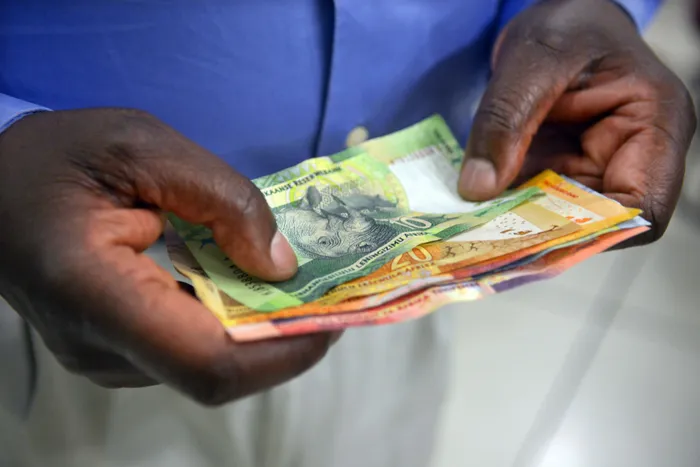
Explore the latest findings on financial stress in South Africa, revealing how debt impacts daily life and the steps consumers are taking to manage their finances amidst rising living costs.
Image: Karen Sandison / Independent Newspapers.
Even though consumers seem to be feeling somewhat less financially stressed lately, there is no doubt that money worries still take a substantial toll on their daily lives.
Debt review company DCGsa paints a sobering picture of debt in South Africa through a collation of numbers on its website: R2.56 trillion in loan balances, R208 billion in overdue payments, and 17.97 million accounts in arrears.
DebtBusters' latest annual Money-Stress Tracker, now in its fourth iteration, found that 70% of respondents have felt money stress this year, which, although an eight-percentage-point decrease since 2023, is still a worrying picture.
The results of the survey, conducted in May and June among 27,000 respondents not currently in debt review, found that nine out of ten who experience money stress say it affects their home life. Almost three-quarters report a negative impact on their work life and health. DebtBusters isn’t alone in finding that money is an issue.
TransUnion’s first-quarter industry insights report, the latest available, found that more money was loaned out in the form of credit cards and car loans than in the same period in 2024. Ayesha Hatea, director of research and consulting at TransUnion, says on its website that “South Africans are increasingly turning to low-value personal loans with shorter repayment terms to manage their monthly expenses.
“However, persistently high delinquency rates, particularly among non-bank personal loans, indicate that many consumers are under significant financial pressure and struggling to meet their loan commitments.”
DebtBusters has previously noted that more consumers are relying on personal loans to cover the gap between income and rising living costs – a trend that only compounds the problem. Its data shows that nearly two-thirds of respondents allocate a third or more of their after-tax income to servicing debt. Almost half spend more than 40% of what they earn on repayments – a level considered unsustainable.
Meanwhile, TransUnion’s second-quarter Consumer Pulse Study found that 39% of respondents couldn’t pay all their bills, and over half had cut discretionary spending. According to DebtBusters, people are increasingly worried about running out of money before the end of the month and are struggling to meet their monthly debt obligations.
The South African Reserve Bank’s (SARB’s) figures, detailed in its June 2025 Quarterly Bulletin, found that household debt as a percentage of nominal disposable income increased marginally between the last quarter of 2024 and the first three months of this year, as household debt increased more than disposable income gained, when taking inflation into account.
At the same time, SARB found that the household cost of servicing debt relative to disposable income edged slightly lower over the same period, reflecting lower interest payments following the further 0.25 percentage point reduction in the prime lending rate in January 2025. Yet, DebtBusters argues that the impact of interest rate increases, while still significant, has subsided compared to 2023 and 2024.
Despite the widespread financial strain, most people are not seeking professional help. Benay Sager, executive head of DebtBusters, said more than 90% of South Africans with unsustainable debt do not proactively seek professional support like debt counselling. “This underscores the ongoing importance of stress-management programmes, financial education, and awareness campaigns that address stigma and promote early intervention,” Sager says. “It also highlights the need for innovative solutions to deal with money stress, particularly those that help consumers stretch their money further.”
TransUnion’s latest consumer survey, conducted between May 5 and 25 with 922 adults, shows that over half of respondents have reduced non-essential spending in areas such as entertainment, dining out, and travel. Yet, DebtBusters notes that fewer people are cutting back than before. Its tracker shows that a third of respondents are actively reducing monthly expenses – down from 43% in 2022.
This suggests that savings fatigue may be setting in. Even so, South Africans are taking steps to manage their finances. “31% accelerated debt repayment and 24% boosted emergency savings. These shifts suggest that while economic strain remains, consumers are adapting their financial behaviours to build resilience and maintain stability in a challenging environment,” says TransUnion.
The credit bureau adds that many consumers are also paying off debt faster, saving more through emergency funds or stokvels, and 37% intend to increase retirement or investment contributions. DebtBusters also points out that while income-boosting behaviour is slightly down from previous years, around two-thirds of respondents are still pursuing side hustles, job changes, or entrepreneurial ventures to improve their financial outlook.
“South Africans are taking ownership of their financial journeys and in doing so, they’re laying the groundwork for lasting stability and inclusion,” says Hatea. This ethos of South Africans making a plan could be why Statistics South Africa recently reported that the total number of civil summonses issued for debt fell by 17.1% in the three months ended May 2025 compared with the same period in 2024. The agency attributed the drop in part to a decrease in money lent and debt owed for goods sold.
And, if people stress less about money, says psychologist Andrea Kelleman, who helped DebtBusters analyse the data, the result is that “people are sleeping and coping a bit better despite elevated financial pressure”. She attributes some of the decline in anxiety to the absence of large-scale disruptions such as loadshedding or social unrest, which “allowed people to regain emotional bandwidth and reframe their financial situation”.
PERSONAL FINANCE